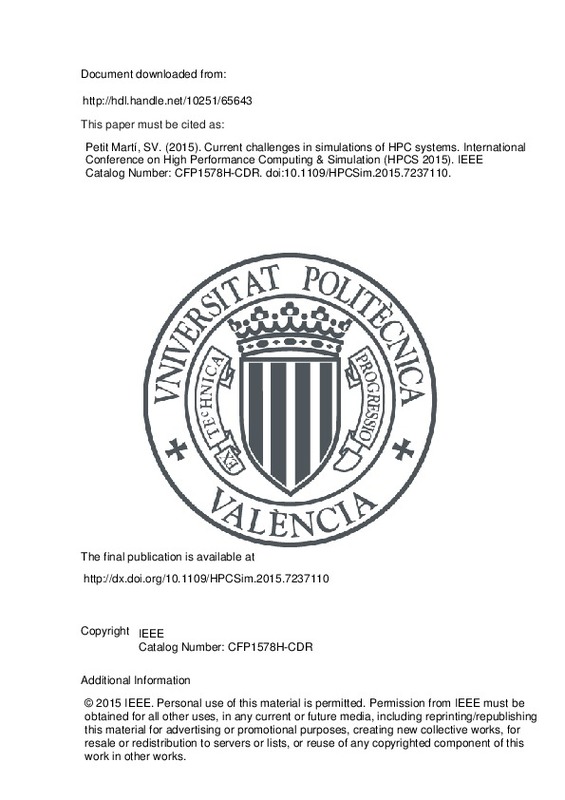JavaScript is disabled for your browser. Some features of this site may not work without it.
Buscar en RiuNet
Listar
Mi cuenta
Estadísticas
Ayuda RiuNet
Admin. UPV
Current challenges in simulations of HPC systems
Mostrar el registro sencillo del ítem
Ficheros en el ítem
| dc.contributor.author | Petit Martí, Salvador Vicente
|
es_ES |
| dc.date.accessioned | 2016-06-10T10:52:28Z | |
| dc.date.available | 2016-06-10T10:52:28Z | |
| dc.date.issued | 2015-07 | |
| dc.identifier.isbn | 978-1-4673-7812-3 | |
| dc.identifier.uri | http://hdl.handle.net/10251/65643 | |
| dc.description | © 2015 IEEE. Personal use of this material is permitted. Permission from IEEE must be obtained for all other uses, in any current or future media, including reprinting/republishing this material for advertising or promotional purposes, creating new collective works, for resale or redistribution to servers or lists, or reuse of any copyrighted component of this work in other works. | es_ES |
| dc.description.abstract | Simulation of many-core HPC systems is nowadays an active and fruitful area of research. Recent and future proposals are driven by the need of a fast, efficient, and comprehensive simulation framework. This simulation framework should be complete in several ways. First, it should model a wide range of components and provide the mechanisms necessary to plug-in more components as needed. Second, it should allow the designer to focus on critical components while avoiding a large part of the simulation complexity. Each of these components should be able to be evaluated with multiple models with distinct detail levels, ranging from simply analytical models to detailed cycle-accurate simulations. Third, a complete simulation framework should provide a wide range of metrics of interest for the designer and the market. Finally, support for heterogeneous architectures combining CPU and GPU, as well as some degree of reconfigurability is surely required. Building such titanic framework is and will be a collaborative process between researchers around the globe and it is expected to be a hot research topic for the next years. | es_ES |
| dc.description.sponsorship | This work has been supported by the Spanish Ministerio de Economía y Competitividad (MINECO), by FEDER funds through Grant TIN2012-38341-C04-01, and by the Intel Early Career Faculty Honor Program Award. | es_ES |
| dc.format.extent | 3 | es_ES |
| dc.language | Inglés | es_ES |
| dc.publisher | IEEE Catalog Number: CFP1578H-CDR | es_ES |
| dc.rights | Reserva de todos los derechos | es_ES |
| dc.subject | HPC systems | es_ES |
| dc.subject | Simulation frameworks | es_ES |
| dc.subject | Parallel simulators | es_ES |
| dc.subject | Approximate models | es_ES |
| dc.subject | Sampling | es_ES |
| dc.subject | Trace-driven simulation | es_ES |
| dc.subject.classification | ARQUITECTURA Y TECNOLOGIA DE COMPUTADORES | es_ES |
| dc.title | Current challenges in simulations of HPC systems | es_ES |
| dc.type | Comunicación en congreso | es_ES |
| dc.identifier.doi | 10.1109/HPCSim.2015.7237110 | |
| dc.relation.projectID | info:eu-repo/grantAgreement/MINECO//TIN2012-38341-C04-01/ES/MEJORA DE LA ARQUITECTURA DE SERVIDORES, SERVICIOS Y APLICACIONES/ | es_ES |
| dc.rights.accessRights | Abierto | es_ES |
| dc.contributor.affiliation | Universitat Politècnica de València. Departamento de Informática de Sistemas y Computadores - Departament d'Informàtica de Sistemes i Computadors | es_ES |
| dc.description.bibliographicCitation | Petit Martí, SV. (2015). Current challenges in simulations of HPC systems. IEEE Catalog Number: CFP1578H-CDR. https://doi.org/10.1109/HPCSim.2015.7237110 | es_ES |
| dc.description.accrualMethod | S | es_ES |
| dc.relation.conferencename | International Conference on High Performance Computing & Simulation (HPCS 2015) | es_ES |
| dc.relation.conferencedate | July 20-24, 2015 | es_ES |
| dc.relation.conferenceplace | Amsterdam, the Netherlands | es_ES |
| dc.relation.publisherversion | http://dx.doi.org/10.1109/HPCSim.2015.7237110 | es_ES |
| dc.type.version | info:eu-repo/semantics/publishedVersion | es_ES |
| dc.relation.senia | 309081 | es_ES |
| dc.contributor.funder | Ministerio de Economía y Competitividad | es_ES |
| dc.contributor.funder | European Regional Development Fund | es_ES |
| dc.contributor.funder | Intel Corporation | es_ES |







![[Cerrado]](/themes/UPV/images/candado.png)

